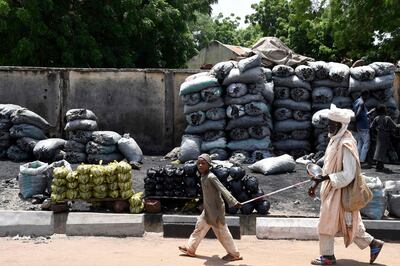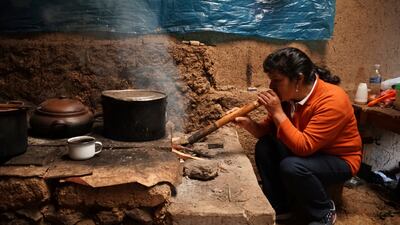For some delegates at Cop26, the summit's focus on coal and cars is overlooking the more homespun issue of the food on our plates.
Lobbyists from Greenpeace to the World Health Organisation have used the summit to call for meat-free diets, which they say are healthier and more sustainable.
But developing countries see another major health risk in the wood and charcoal stoves used by millions of people that cause household air pollution and damage the environment.
Some 900 million Africans lack access to clean cooking and 4 million people a year die prematurely because of illnesses linked to solid fuels, Kenyan Energy Minister Monica Juma said.
“I think it should just not be acceptable that people would meet their deaths this way,” she said on the sidelines of the Glasgow summit, where she called for investment in clean cooking.
“For a long time this was a small pilot project. We need to scale it up. That’s what we need out of Glasgow.”
Ms Juma said upgraded cooking facilities would especially help women and girls, who typically carry much of the domestic burden.
“It’s not about philanthropy. There’s a business case here,” she said. “A mother that takes less time to cook saves time for productivity.
“There’s this perception about this being small scale. 900 million people not having access to clean energy – this is a big market.”

Kenya hopes to expand electric cooking and promote other cleaner fuels such as ethanol, biogas and liquefied petroleum gas (LPG).
The last of these is on the rise as a household fuel in Nepal, said Ram Gopal Kharbuja, a joint secretary in the country’s Energy Ministry.
But Nepal would prefer people to switch to electric stoves, he said, because LPG has to be imported whereas hydroelectric plants can generate power from mountain rivers.
“We are promoting the use of electrical energy for domestic, industrial as well as transport,” he said. The latest climate plan submitted by Nepal to the UN calls for a quarter of residents to use electricity for cooking by 2030.
While these goals aim to improve health and cut greenhouse gas emissions, installing electric stoves in households is not always easy.
Nepal has experimented with miniature electric grids that do not need to be connected to a wider infrastructure. But tariffs on these can be expensive, said Simon Batchelor, a development expert at Loughborough University in the UK.
Collecting revenue is another issue because people who are used to collecting wood for fuel – paying for energy with their labour rather than with cash – are reluctant to hand over money for electricity, he said.
“When you go to communities there are many people who don’t understand these terms,” said Anne Songole of the Access Coalition, a civil society group. “They know food and they know it tastes good.
“As I look at Cop26 today, we are actually talking about coal but we have really neglected cooking, which is an important issue.”
It is not only activists from developing countries who want to talk about food. Many around the world see meat as an unacceptable luxury given the emissions it creates and the availability of plant-based substitutes.
Livestock is one of the major sources of methane, a greenhouse gas which world leaders pledged on Tuesday to stop emitting so rapidly.

Meat question
Critics of the pledge, which aims to cut emissions by 30 per cent this decade, say it dodged the question of reducing meat intake.
“Meat reduction offers an immediate solution to cutting methane in the near term because methane dissipates quickly,” said Anna Jones, a Greenpeace spokeswoman for food issues.
“Rapidly phasing out industrial meat production would help us buy precious time.”
Politicians have sought to defuse the sometimes highly charged issue by insisting that people will not have to give up meat.
In Glasgow, vegan and vegetarian activists are lobbying delegates to invest in plant-based food production around the world.
A lobby group called ProVeg International described meat production as an “elephant in the room”, which had not been sufficiently addressed by leaders.
However, it welcomed the lack of beef dishes on a menu at the Cop26 venue, which includes an estimate of an item’s carbon footprint.
“While the menu still isn't completely plant-based, it is clear from the display that they are the most environmentally friendly choices,” ProVeg activists said.
“We're happy to see that delegates are encouraged to not only talk about the climate crisis but to tackle it with their food choices as well.”

